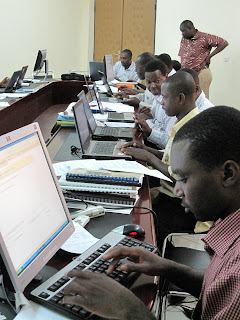by Elizabeth Corley
For many people in the development community, the annual conference of the Global Health Council is the highlight of the year. The conference brings together practitioners from around the world and is a great opportunity to meet up with old friends and colleagues and meet new ones. This year's theme is about new technologies. One that comes to mind is the "call me back" function on mobile phones used to increase awareness and testing for HIV/AIDS as described by Andrew Zolli, curator of the Pop!Tech conference.
The Global Health Councils has done a great job incorporating the new media. Participants are able to send in questions to speakers via Twitter, upload pictures to flickr, and read the conference blog.
For anyone who ever thought that this sector is behind the curve in terms of adopting new technologies, it is time to look again. Lots of creative applications highlighted. My favorite part is the media awards. One of this year's winners was Engle Entertainment, producer of Walk to Beautiful a documentary about women suffering from obstetric fistula. (Development Gateway put together a special collection on this topic in March of this year.) The documentary will be available on DVD the first week in June.
The most entertaining attraction in the exhibition hall at the Global Health Council annual conference is the gambling table at the Gapminder booth. On the table is a grid with average number of children on the y axis and life expectancy on x axis. The croupier selects a developing country at random. A dot appears on the table representing where that country stood for those two indicators in 1950. Players then place their chips on the table to indicate where they think the country is now. More dots appear--magically-- tracking changes in these indicators over time. The movement of the data points vividly illustrates progression, and sometimes regression, of the country.
Thursday, May 28, 2009
Thursday, May 21, 2009
Starting the team blog

We’re starting this team blog to engage our stakeholders in conversation. It is a way to let you know what we are doing and hear your thoughts about ICT4D and aid effectiveness.
Our programs have a wide audience. Just this week Emily Kallaur is in Miami at the International Consortium on Governmental Financial Management annual conference. Nadia Afrin is giving the keynote address for a Web cast on South Asia and nanotechnology for development. Steve Davenport, Francis Dogo, and Djamila Kerim are conducting a needs assessment in Haiti as part of the aid management program. All of these activities are part of our effort to use information and communications technology to reduce poverty.
The aid management program has been implemented in Africa and Latin America. Here you can see some government staffers in Burkina Faso working with the Aid Management Platform. The photo was taken by Anna who writes on European policy.
As an organization, we have evolved since our founding in 2000. In the coming months, we plan to integrate our programs more. Look here to find out how we go about it and to discuss other issues related to development and aid effectiveness
Our programs have a wide audience. Just this week Emily Kallaur is in Miami at the International Consortium on Governmental Financial Management annual conference. Nadia Afrin is giving the keynote address for a Web cast on South Asia and nanotechnology for development. Steve Davenport, Francis Dogo, and Djamila Kerim are conducting a needs assessment in Haiti as part of the aid management program. All of these activities are part of our effort to use information and communications technology to reduce poverty.
The aid management program has been implemented in Africa and Latin America. Here you can see some government staffers in Burkina Faso working with the Aid Management Platform. The photo was taken by Anna who writes on European policy.
As an organization, we have evolved since our founding in 2000. In the coming months, we plan to integrate our programs more. Look here to find out how we go about it and to discuss other issues related to development and aid effectiveness
Subscribe to:
Comments (Atom)



